- Home
- Mario Puzo
The Dark Arena
The Dark Arena Read online
Praise for Mario Puzo's final novel
Omerta
“[A] deft and passionate last novel by the Balzac of the Mafia.”
—Time
“A splendid piece of crime fiction … A fitting cap to a tremendous career … Through it all, Puzo keeps the heat on and keeps the reader enthralled with his characters and his story.”
—The Denver Po'tt
“In Omerta (the Sicilian code for silence), Puzo cements his reputation as a page-turning stoiyteller.”
—Detroit Free Pr&M
“A seriously guilty pleasure … as with The Godfather, the reader gets sucked into the plot immediately.”
—The New York Post
“Puzo suffuses the novel with many of the ingredients his readers crave, tantalizingly documenting the lavish lifestyles and sexual exploits of his hot-blooded characters.”
—The Miami Herald
By Mario Puzo
Fiction;
THE DARK ARENA*
THE FORTUNATE PILGRIM*
THE GODFATHER
FOOLS DIE
THE SICILIAN*
THE FOURTH K*
THE LAST DON*
OMERTA*
THE FAMILY
THE GODFATHER RETURNS*
Nonfiction:
THE GODFATHER PAPERS
INSIDE LAS VEGAS
Children's Book:
THE RUNAWAY SUMMER OF DAVIE SHAW
Books published by The Random House Publishing Group are available at quantity discounts on bulk purchases for premium, educational, fund-raising, and special sales use. For details, please call 1-800-733-3000.
* Published by The Random House Publishing Group
for erika
“Fathers and teachers, I ponder “What is hell?” I maintain that it is the suffering of being unable to love.”
“Oh, there are some who remain proud and fierce even in hell, in spite of their certain knowledge and contemplation of the absolute truth; there are some fearful ones who have given themselves over to Satan and his proud spirit entirely. For such, hell is voluntary and ever consuming; they are tortured by their own choice. For they have cursed themselves, cursing God and life. They live upon their vindictive pride like a starving man in the desert sucking blood out of his own body. But they are never satisfied, and they refuse forgiveness, they curse God Who calls them. They cannot behold the living God without hatred, and they cry out that the God of life should be annihilated, that God should destroy Himself and IDs own creation. And they will burn in the fire of their own wrath forever and yearn for death and annihilation. But they will not attain to death … “
—The Brothers Karamazov,
FYODOR DOSTOEVSKI
one
Walter Mosca felt a sense of excitement and the last overwhelming loneliness before a home-coming. The few ruins outside of Paris were remembered and familiar landmarks, and now on the last leg of his journey he could hardly wait to come to his final destination, the heart of the ruined continent, the destroyed city that he had never thought he would see again. The landmarks leading into Germany were more familiar to him than the approaches to his own land, his own city.
The train rocked with speed. It was a troop train with replacements for the Frankfort garrison, but half the car was taken by civilian employees recruited from the States. Mosca touched his silk tie and smiled. It felt strange to him. He would feel more at home with the GIs at the other end, and, he thought, so would most of the twenty or so civilians with him.
There were two dim lights, one at each end of the car. The windows were boarded up, as if the car had been built so that its occupants would not be able to see the vast ruins through which they would travel. The seats were long wooden benches, leaving only one very narrow aisle along one side.
Mosca stretched out on his bench and put the blue gym bag under his head for a pillow. In the bad light he could hardly recognize the other civilians.
They had all traveled on the same Army ship together, and like himself, they all seemed excited and eager to reach Frankfort. They talked loudly to be heard over the roar of the train, and Mosca could hear Mr. Gerald's voice dominating the rest. Mr. Gerald was the highest ranking civilian in the shipment. He had with him a set of golf clubs, and on board the ship had let everyone know that his civilian grade was equal to the rank of colonel. Mr. Gerald was happy and cheerful, and Mosca had a vision of him playing golf over the ruins of a city, the long drive above flattened and level streets, the approach to a rounded heap of rubble, and putting carefully into the top of a decaying skull.
The speed of the train slackened as it moved into a small deserted station. Outside it was night, and in the blind railroad car it was very dark. Mosca dozed, hearing only vaguely the voices of the others. But as die train picked up speed leaving the station it shook him fully awake.
The civilians were talking more quietly now, and Mosca sat up to watch the soldiers at the other end of the car. Some were sleeping on the long benches, but there were three circles of light surrounding three card games, giving their end of the car a friendly glow. He felt a faint nostalgia for the life he had led so long and left just a few months ago. By the light of their candles he could see them drinking from their canteens, not water he felt sure, and breaking out K rations to munch chocolate bars. A GI was always prepared, Mosca thought with a grin. Blankets on his back, candles in his pack, water or something better in his canteen, and a rubber in his wallet at all times. Ready for good luck or bad.
Mosca stretched out again on the bench and tried to sleep. But his body was as stiff and unyielding as the hard wood beneath it. The train had picked up speed and was going very fast now. He looked at his watch. It was nearly midnight, and it was still a good eight hours to Frankfort He sat up, took a bottle from the small, blue gym bag and, resting his head against the boarded window, kept drinking until his body relaxed. He must have fallen asleep, for when he looked down again to the soldiers” end of the car, there was only one circle of candlelight; but in the darkness behind him he could still hear the voices of Mr. Gerald and a few other civilians. They must have been drinking, for Mr. Gerald's voice was patronizing, condescending, and he was boasting of his coming power, how he would put his paper empire on an efficient basis.
Two candles detached themselves from the circle at the other end of the car, their flares wavering unevenly down the aisle. As they passed him, Mosca was startled out of his drowsiness. The GI carrying the candles had on his face a look of malevolent and stupid hatred. The bright yellow glow of the candles dyed the already drink-flushed face a dark red and gave the sullen eyes a dangerous, senseless look.
“Hey, soldier,” the voice of Mr. Gerald called out, “how about leaving us a light?”
The candle obediently came to rest near Mr. Gerald and his group of civilians and the sound of their voices rose, as if they had taken courage from the flickering light. They tried to include the GI in their conversation, but he, his candles resting on the bench, his own face in darkness, refused to answer. They forgot about the soldier and spoke of other things; only once Mr. Gerald, leaning into the candlelight as if to show himself with absolute trust, said condescendingly but with real kindness to the GI, “We were all of us in the Army, too, you know.” And then with a laugh to the others, “Thank God that's over.”
One of the other civilians said, “Don't be too sure, we still have the Russians.”
They forgot about the GI again until suddenly over and above their voices, above the noise of the train running so blindly across the continent, the silent GI shouted loudly and in drunken arrogance, yet as if in some panic, “Shut up, shut up, don't talk so much, shut your goddamn mouths.”
There was a moment of surprised, embarrassed silence, a
nd then Mr. Gerald leaned his head into the candlelight again and said to the GI quietly, “You had better get to your end of the car, son.” There was no answer from the GI, and Mr. Gerald continued to speak, picking up where he had been interrupted.
Suddenly he was standing up, fully lit by the flaring candles, his voice cut off. And then he said quietly, without alarm but with almost terrified disbelief, “My God, I've been hurt. That soldier did something to me.”
Mosca sat up straight and other dark figures rose from the benches, one of them knocked out a candlelight as he brushed it to the floor. Mr. Gerald, still standing but not so brightly lit, said in a quiet horrified voice, “That soldier stabbed me,” and fell out of the light into the darkness of his bench.
Two men from the GI end of the car hurried down the aisle. By the light of the candles they carried, Mosca could see the glint of officer bars.
Mr. Gerald was saying over and over again, “Tve been stabbed, that soldier stabbed me.” In his voice the terror was gone, it was surprised, incredulous. Mosca could see him sitting upright on the bench and then, lit up by the full power of the three candles, could see the rent in the trouser leg, high up on the thigh, the dark stain flowing over and around it. The lieutenant bent over, holding his candle close and gave an order to die soldier with him. The soldier ran down to the other end of the car and returned with blankets and a first-aid kit. They spread the blankets on the floor and made Mr. Gerald lie down. The soldier started to cut off the trouser leg, but Mr. Gerald said, “No, roll it up; I can get it mended.” The lieutenant looked at the wound.
“It's nothing much,” the lieutenant said. ‘Wrap him in a blanket” There was no sympathy in his young, blank face or in his voice, only an impersonal kindness. “Well have an ambulance waiting in Frankfort, just in case. Ill wire at the next stop.” Then he turned to the others and asked, “Where is he?”
The drunken GI had disappeared; Mosca, peering into the darkness, saw a form huddled in the corner of the tench before him. He said nothing.
The lieutenant went to his end of the car and returned wearing his pistol belt. He threw the beam erf his flashlight around the car until he saw the huddled form. He prodded it with his flashlight, at the same time drawing his pistol and hiding it behind him. The GI didn't move.
The lieutenant poked him roughly. “Get up, Mulrooney.” The GI opened his eyes, and when Mosca saw the dumb, sullen animal glare, he felt a sudden pity.
The lieutenant kept the beam of his flashlight in the soldier's eyes, blinding him. He made Mulrooney stand up. When he saw that his hands were empty, he slipped his pistol back into its holster. Then he turned the GI around with a rough shove and searched him. He didn't find anything, so he threw the light of his flash on the bench. Mosca saw the bloodstained knife. The lieutenant picked it up and pushed the GI ahead of him to the other end of the car.
The train began to slow down and gradually came to a halt. Mosca walked to the end of the car, opened the door, and looked out. He saw the lieutenant going to the station to wire ahead for the ambulance; otherwise there was no one. The French town behind the station was dark and still.
Mosca went back to his bench. Mr. Gerald's friends were bending over him, reassuring him, and Mr. Gerald was saying impatiently, “I know it's a scratch, but why did he do it, why did he do such a crazy thing?” And when the lieutenant came back into the car and told them the ambulance would be waiting at Frankfort, Mr. Gerald said to him, “Believe me? Lieutenant, I did nothing to provoke him. Ask any of my friends. I did nothing, nothing, to make him do such a thing.”
“He's just crazy, that's all,” the lieutenant said. And then added, “You're lucky, sir, if I know Mulrooney he was aiming at your balls.”
For some reason this seemed to cheer them up, as if the seriousness of intent made the event more interesting, made the scratch on Mr. Gerald's thigh important. The lieutenant brought Ms bedroll back and fixed Mr. Gerald on it. “In a way you did me a favor. Pve been trying to get rid of Mulrooney since the first day he came into the platoon. Hell be safe for a couple of years now.”
Mosca couldn't sleep. The train had begun to move, and he walked down to the door again, rested against it, and looked at the black, shadowy countryside pass by. He remembered the same, nearly the same, land going by so slowly, from the back of trucks, tanks, on foot, crawling on the ground. He had believed he would never see this country again, and he wondered now why everything had turned out so badly. He had dreamed for so long about going home, and now he had left again. In the darkened train, he remembered his first night at home.
The large square sticker on the door had read Welcome Home, Walter, and Mosca noticed that similar stickers with different names were pasted on two of the other apartment doors. The first thing he saw when he entered the apartment was the picture of himself taken just before he went overseas. Then his. mother and Gloria swarmed over him, and Alf was shaking his hand.
They all stood away from each other, and there was just one moment of awkward silence.
“You've gotten older,” his mother said, and they all laughed. “No, I mean more than three years older.”
“He hasn't changed,” Gloria said, “He hasn't changed a bit.”
“The conquering hero returns,” Alf said. “Look at all those ribbons. Did you do something brave, Walter?”
“Standard,” Mosca said; “most of the WACs got the same set” He pulled off his combat jacket and his mother took it from him. Alf went into the kitchen and came out with a tray of drinks.
“Ouist,” Mosca said, startled, “I thought you lost a leg.” He had completely forgotten his mother writing about Alf. But his brother had obviously been waiting for this moment. He drew up his trouser leg.
“Very pretty,” Mosca said. “Tougji luck, Alf.”
“Hell,” Alf said, “I wish I had two of ‘em. No athlete's foot, no ingrown toenails—you know.”
“Sure,” Mosca said. He touched his brother's shoulder and smiled.
“He put it on especially for you, Walter,” his mother said. “He doesn't usually wear it around the house even though he knows I hate to see him without it.”
Alf raised his drink. “To the conquering hero,” he said, and then with a smile, turning to Gloria, “To the girl who waited for him.”
“To our family,” Gloria said.
“To all my children,” his mother said affectionately. Her glance included Gloria. They all looked at Mosca expectantly.
“Let me drink this one, and then I can think of something.”
They all laughed and drank.
“And now for supper,” his mother said. “Help me set the table, Alf.” The two of them went into the kitchen.
Mosca sat down in one of the armchairs. “A long, long trip,” he said.
Gloria went over to the mantel and picked up the framed photo of Mosca. With her back to him she said, “Every week I'd come here and look at the picture. I'd help your mother get supper, we'd eat together, and then sit here in this room, looking at this picture and talking about you. Every week, for three years, like people visiting a cemetery, and now that you're back it doesn't look a bit like you.”
Mosca got up and went over to Gloria. Putting his arm on her shoulder he looked at the picture, wondering why it irritated him.
The head was thrown back in. a laugh, and he had obviously stood so that the black and white diagonal stripes of his division would show clearly. The face was youthful and full of an innocent good nature. The uniform was nattily fitted. Standing there in the heat of the southern sun he had been a typical GI getting himself photoed for an adoring family.
“What a jerky grin,” Mosca said.
“Don't make fun of it. That was all we had for a long time.” She was silent for a moment. “Ah, Walter,” she said, “how we cried over it sometimes, when you didn't write, whenever we heard rumors about a troop ship being sunk or a big battle being fought. On D day we didn't go to church. Your mother sat on the couch,
and I sat here by the radio. We just sat here all day. I didn't go to work. I kept turning the radio to different stations; as soon as one news bulletin was finished I'd try to get another station, even though it would say the same thing. Your mother just sat there with a handkerchief in her hand, but she didn't cry. I slept here that night, in your room, in your bed, and I took the picture with me. I put it on the dresser and said good night to it, and then I dreamed that I would never see you again. And now here you are, Walter Mosca, in the flesh, and you don't look a bit like the picture.” She tried to laugh, but she was crying.
Mosca was embarrassed. He kissed Gloria gently. “Three years is a long time,” he said. And he thought, On D day I was in an English town getting drunk. I was giving a little blonde what she claimed was her first drink of whisky and her first lay. I was celebrating D day but even more celebrating that I wasn't in it He had a strong desire to tell Gloria the exact truth, that he hadn't thought of them that day, or of anything that they had thought of, but all he said was, “I don't like the picture—And besides when I came in you said I hadn't changed a bit.”
“Isn't it funny,” Gloria said, “when you came in the door you looked exactly like your picture. But when I kept looking at you it seemed as if your whole face had changed.”
His mother called from the kitchen, “It's ready,” and they went into the dining-room.
All his favorite foods were on the table, the rare roast beef with the small roasted potatoes, a green salad, and a slab of yellow cheese. The tablecloth was snowy white, and when he was finished he noticed the napkin untouched beside his plate. It had been good but not as good as he had dreamed it would be.
“Ah.” Alf said, “a big difference from GI chow, hey, Walter?”
“Yeah,” Mosca said. He took from his shirt pocket a short fat, dark cigar and was about to light it when he noticed they were all looking at him with amusement, Alf. Gloria, and his mother.

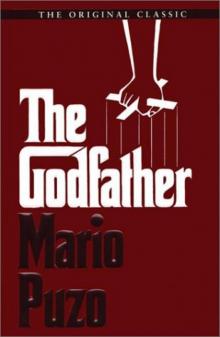 The Godfather
The Godfather The Dark Arena
The Dark Arena The Family
The Family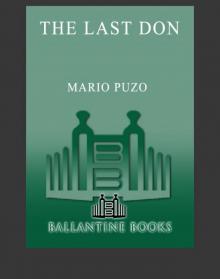 Last Don
Last Don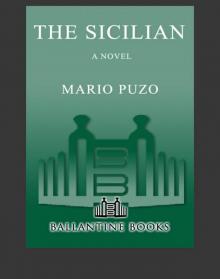 The Sicilian
The Sicilian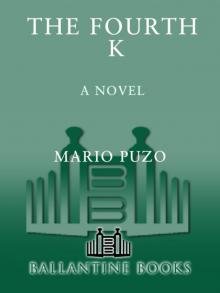 The Fourth K
The Fourth K Omerta
Omerta Six Graves to Munich
Six Graves to Munich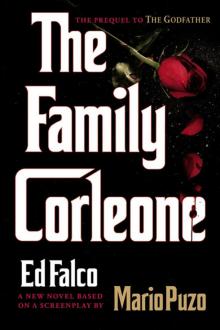 The Family Corleone
The Family Corleone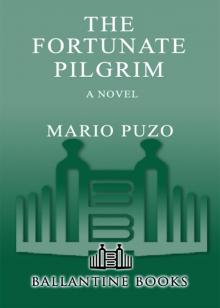 The Fortunate Pilgrim
The Fortunate Pilgrim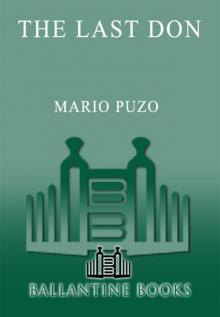 The Last Don
The Last Don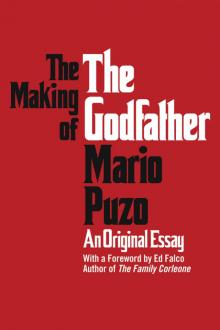 The Making of the Godfather
The Making of the Godfather Fools die
Fools die The Sicilian (v2.0)
The Sicilian (v2.0)